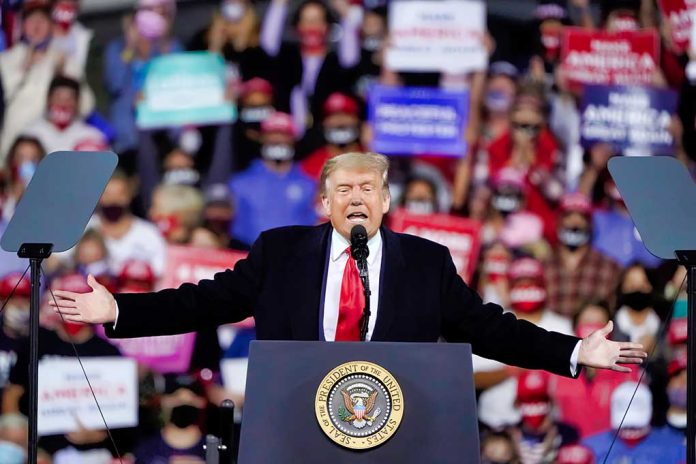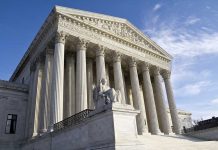
Donald Trump has stirred a new controversy by suggesting that Taylor Swift endorses him, using AI-generated images depicting the pop star and her fans in support of his campaign.
At a Glance
- Donald Trump falsely implied Taylor Swift’s endorsement by posting AI-generated images.
- Images showed Swift and her fans supporting Trump, leading to backlash.
- Swift has not endorsed any 2024 candidate and criticized Trump during his presidency.
- Legal experts suggest Swift could sue Trump over misuse of her likeness and false endorsement.
Trump’s Alleged Misleading Campaign Images
Donald Trump’s recent social media activities have brought widespread attention. He posted AI-generated images falsely suggesting that music star Taylor Swift and her fans, known as Swifties, support his campaign. The images, including one depicting Swifties in “Swifties for Trump” t-shirts, stirred considerable backlash from Swift’s followers and raised ethical and legal concerns.
Sources report that Swifties have accused Trump of spreading misinformation through these doctored photos. Taylor Swift, who has been vocal about her political stances, especially during the last election cycle, has not endorsed any candidate for the 2024 Presidential Election. She previously supported Democrats and criticized Trump’s policies.
Ethical and Legal Ramifications
The use of AI to create fake endorsements opens several ethical and legal debates. AI has the power to replicate an individual’s voice and likeness, which in this case wrongly presents Taylor Swift as a Trump supporter. Such actions may violate intellectual property rights, constituting misuse of Swift’s public persona and trademarks.
“I accept!” – Donald Trump on Truth Social
Legal experts say that Swift can pursue a lawsuit against Trump for creating and distributing these false AI endorsements. She might have grounds under the Lanham Act of 1946, protecting celebrities from unauthorized use of their likeness. However, opinions differ on the likelihood of a successful lawsuit, with many suggesting that a cease-and-desist letter might be more practical. Publicly denouncing the false endorsement is another strategy Swift could employ.
Former President Donald Trump has shared AI-generated images that falsely claim he has Taylor Swift’s support. pic.twitter.com/GumenpEDZw
— Access Hollywood (@accesshollywood) August 19, 2024
Public Backlash and Swift’s Options
Swifties, known for their strong allegiances and online activism, have been vocal in expressing their dismay. The backlash highlights the broader concern over deepfakes’ impact on public perception and misinformation. These concerns underscore how AI can influence political campaigns and public opinion.
“Swift could sue Trump and those who misappropriated her likeness by creating AI-generated images,” Neama Rahmani, the president and a cofounder of West Coast Trial Lawyers, said. “Privacy torts protect people from having their name, image, or likeness used without their permission,” he said. “Manipulating it using AI doesn’t change things.”
This incident isn’t isolated. Deepfakes have appeared before, including those falsely showing minority groups supporting Trump, though without direct ties to his campaign. Such occurrences reinforce the necessity for stringent regulations and ethical guidelines on AI use, especially as technology evolves.
Trump on AI-generated Taylor Swift images: 'I don’t know anything about them' https://t.co/s9Ans9USM9
— News 19 (@whnt) August 22, 2024
Swift’s Potential Legal Steps
If Swift decides to take legal action, her lawyers could argue misuse of likeness, false advertisement, and trademark infringement. She could also seek an injunction to have these misleading posts removed from social media. However, legal avenues might be complicated by First Amendment protections around political speech. Successfully proving damage and intent to deceive voters would be crucial for Swift to win any lawsuit.
“The Lanham Act—which Congress adopted quite some time ago—protects celebrity ‘brands’ and gives celebrities a cause of action against people or corps that try to use the celebrity’s likeness to mislead consumers,” Pace University law professor Leslie Garfield Tenzer told Forbes.
The growing presence of deepfakes in political discourse signifies a troubling trend. Stricter regulations and clearer ethical lines for AI use are essential to avoid misuse that could mislead the public and tarnish reputations. The outcome of this incident might set a precedent for how future cases will be managed.
Sources
1. Donald Trump May Have Violated Lanham Act With Taylor Swift Image Use
2. Donald Trump ‘accepts’ AI-generated photos claiming Taylor Swift’s endorsement









